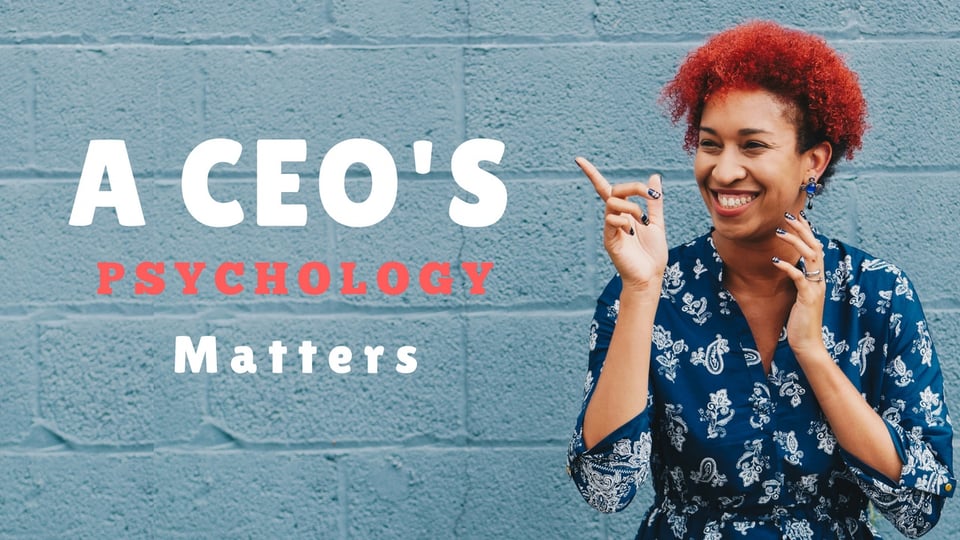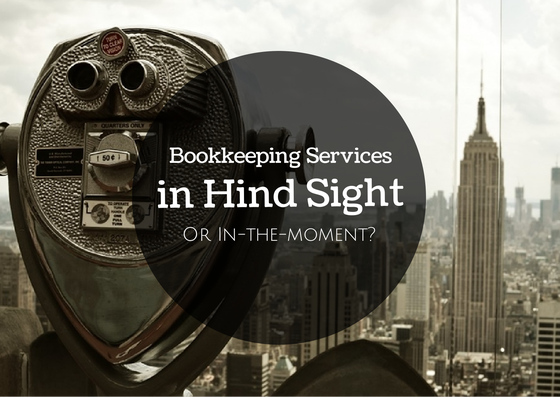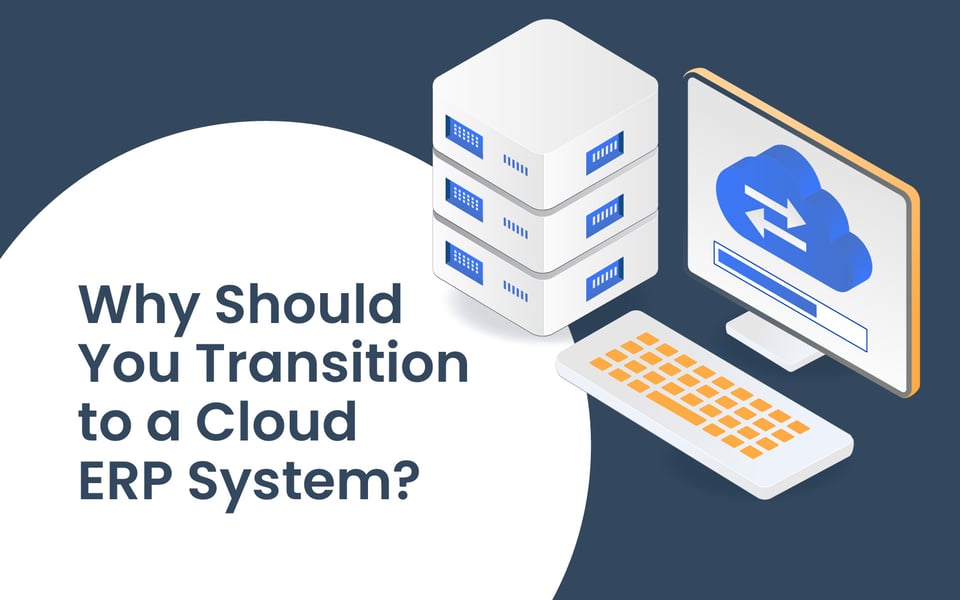Photo by Eye for Ebony on Unsplash
The success of your organization is entirely dependent on your psychology as the CEO. If your psychology is poor, your business will be poor. In this article, we're going to explore how your brain is ultimately at the root of most successes and failures within your organization.
One of my early clients, we won't name names, had poor psychology and his business suffered from it every day. I remember attending meetings with him and his team on a weekly basis and feeling very uncomfortable with his remarks. He would often say things like:
"I'm the Michael Jordan of business and all of you are six-year-olds trying to dribble the ball in your pee-wee basketball camps."
He made his team feel very small, and when something went wrong, which was multiple times a day, he would explode in a violent tirade of cuss-words and spitting. He was a real gem.
This man was not in business for very long. He blamed all of his problems on his staff and never considered his own impact on the organization.
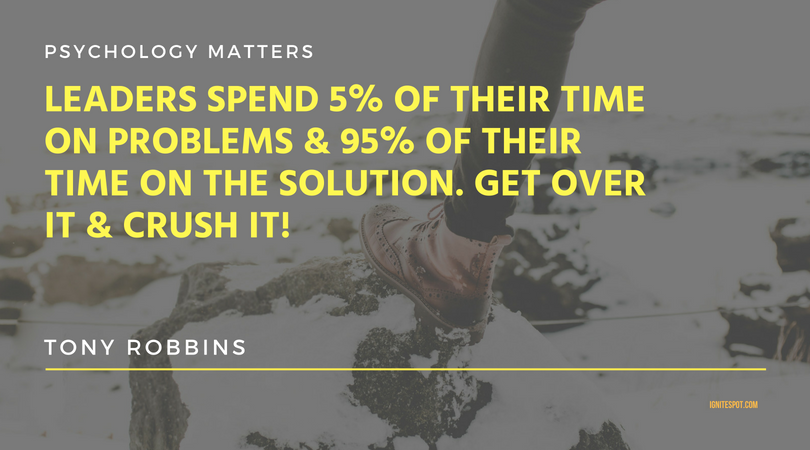
Photo byGrant RitchieonUnsplash
Look at each business you engage with. If the CEO is happy, the staff is usually happy. If the CEO is detail-oriented, the staff usually follows suit. If the CEO is a throbbing mess of insanity, the staff is usually a pile of bowel-movements stinking up the room. Enough said.
I'm usually a very optimistic and energetic guy, so when you engage with the accounting services here at Ignite Spot, you'll notice that our staff is the same. In fact, we get a lot of referrals for simply having way more "personality" than the "standard accountant." Read into that as you will.
Which personality type are you?
- A fear-monger who uses pain and threats to motivate your staff?
- A happy-go-lucky soul that believes everyone will make the world a better place?
- A detail-oriented analytic that drives everyone and everything on numbers alone?
- An absent-minded leader who gives control to everyone else to create a false sense of delegation?
- An over-confident CEO with lots of ideas and no follow-through?
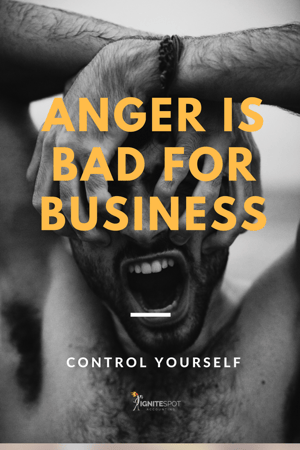
There are many archetypes of a CEO. You may feel that the ones I've listed aren't positive and that none of them describe you. That may be the case. Either way, take some time to discover your real psychology and then look at your organization. Do you see hints of yourself around every corner? I bet you do.
Note that there are pros and cons with each kind of psychology. The fear-monger gets stuff done, but at what expense? The happy-go-lucky soul has lots of friends and a good company culture, but not a lot of accountability. The detail-oriented analytic knows the numbers but not the people behind them. The absent-minded leader has built a team, but has no idea what they're doing. The over-confident CEO has the potential to change the world, but lacks the chops to execute.
None of them are bad. You just need to be aware of where you sit so that you can begin to make improvements. Remember: fix your psychology, fix your company.
What does it mean to be calm?
One major improvement you can make regardless of your psychology type is to gain a sense of calmness. Running a business is no place for a neurotic CEO that can't focus on something for longer than five seconds. Business is hard and it requires mental discipline. Every decision you make effects your staff, your costs, and your future. There is little room for error in the decision-making department so having control of your brain becomes very important.
Andy Puddicomb, CEO of Headspace (The #1 meditation app on the Apple Marketplace), says that a calm mind is a clear mind. Let me say that again, "A calm mind is a clear mind."
Andy should know. He gave up his very busy lifestyle to become a monk for ten years. Now that he's back, he's working very hard to bring some clarity to our chaos. I personally use Headspace everyday as a guided meditation.
Check out his popular TED talk to learn more about your brain.
Think about all of the inputs you face as a CEO. There are sales orders, mistakes, employee negotiations and hr issues, shipping delays, accounting problems (unless you use Ignite Spot of course!), late payments, and more. Each conversation crosses your desk in some form. You may not be the person handling them, but as the CEO you darn well know about them.
 By noon you feel like burnt toast. Your edges are blackened and you're crumbling at the touch. Suddenly an important business decision crosses your desk and you, in your poor mental state, are expected to do the right thing. Chances are, you'll get it wrong in your current state. You'll choose something without considering all the options or the correct ones. You'll misunderstand some of your data-points. You might even realize that you have no idea what to do and so you make a guess hoping for the best.
By noon you feel like burnt toast. Your edges are blackened and you're crumbling at the touch. Suddenly an important business decision crosses your desk and you, in your poor mental state, are expected to do the right thing. Chances are, you'll get it wrong in your current state. You'll choose something without considering all the options or the correct ones. You'll misunderstand some of your data-points. You might even realize that you have no idea what to do and so you make a guess hoping for the best.
As a CEO, you must remain calm in the face of your storms.
Having a calm mind does several things, including:
- Putting some space between you and the events that happen to you
- Giving you the freedom to choose your emotional response
- Separating your emotions from actual logic and facts
- Building confidence in your final decisions
But how do you do it? How do you get and stay calm as a CEO?
In his books, Congregational Leadership in Anxious Times: Being Calm and Courageous No Matter What, author Peter Steinke put it best by saying:
People vary considerable in how they address emotionally challenging events. On the lower (immature) side, people are reactive. They blame more often; they criticize harshly; they take offense easily; they focus on others; they want instant solutions; they cannot see the part they play in problems. On the higher (mature) side, people are more thoughtful and reflective; they act on principle, not instinct; they can stand back and observe. They are responsive. Intent and choice characterize their behavior.
How do you get calm?
There are several ways to get calm. I'll share with you how I do it, and maybe one of these paths will resonate with you.
Daily Meditation
Tim Ferris, Author of The Four-Hour Work Week, taught me about meditation. Here's a few references from Tim's writings on why he does it:
- The Tim Ferriss Show Transcripts: Meditation, Mindset, and Mastery
- Meditation Tactics from Tim Ferris and Kevin Rose
 I use to think mediation was a load of crock. It's not. After reading Tim's thoughts, I decided to give it a try. I've been meditating every day now for over three months and have experienced a significant difference in how I process problems, work with my kids, and deal with stress. There are many ways to meditate, but the reason I like Andy Puddicomb and Headspace is that he teaches it in a very practical way. You don't use incense. You don't sit lotus style in free flowing clothes. All you do is sit in a chair and listen to him speak to you. It's powerful. Try it for a month before you discredit it like I did.
I use to think mediation was a load of crock. It's not. After reading Tim's thoughts, I decided to give it a try. I've been meditating every day now for over three months and have experienced a significant difference in how I process problems, work with my kids, and deal with stress. There are many ways to meditate, but the reason I like Andy Puddicomb and Headspace is that he teaches it in a very practical way. You don't use incense. You don't sit lotus style in free flowing clothes. All you do is sit in a chair and listen to him speak to you. It's powerful. Try it for a month before you discredit it like I did.
Not sold on the idea? Take a moment to learn from Andy Puddicombe about the benefits of meditation and being calm.
Leadership Training
If you're like most of us, this is your first time being a CEO. If you've been around the block before, there's still a lot to learn. I am amazed at how much I have to learn to stay relevant and useful within my own company. One way I find calmness is by attending leadership training conferences. The act of admitting that I don't know everything as a leader and CEO is actually refreshing. There have been so many times where I didn't know what to do in my own company and the shear pressure created chaos in my psychology that generated downward spirals in our performance.

One of my favorite leadership trainings is Leadership Academy by Tony Robbins. It's a brilliant way to understand who you are, what you need to do to lead, and how to break through and mange your brain.
The Gym
The gym is my sanctuary. I go every day, and when I am there, I find peace. In the gym, it's just me and some iron. Working through a difficult session creates a sense of calm that you can handle anything.

Photo by Victor Freitas on Unsplash
Fitness has a way of transforming us mentally. As we become more fit, we become more confident. As we become more confident, we become more approachable and more likable. Those kinds of characteristics go a long way in business. Yes, it's true that we can get too confident by going to the gym. Our opinion of ourselves can skyrocket as we wink at ourselves in the mirrors. That is not the kind of confidence I'm talking about here. Instead, I'm talking about appreciating your true power and your ability to overcome obstacles while others sit on the couch and complain.
Practice Calmness
Another way I like to gain a sense of calm in my psychology is simply to practice it. A calm mind is earned over time. Just because you read this article, that does not mean that a light switch of calmness has been flipped for you and all will be well. As you face your storms, be aware that you'll handle them poorly at first. That's alright. Forgive yourself. Replay the situation in your mind once you've calmed down and decided how you will act in that same situation the next time that it happens.
For example, you may get news today that your company just lost a client. In a moment of rage, you might guilt a staff member or say something you shouldn't. For now, that's alright. Once you calm down, replay the event and consider what logical options would have served you, your staff, and your company at a higher level.
What are the benefits?
There is a space that exists between the things that happen to you and how you respond to them. That space is crucial to the success of your business. Your goal is to be in full control of how that space is utilized. In other words, you want to be able to choose your response to your events rather than operate off of knee-jerk reactions and emotions.
I hate feeling out of control in business. There's nothing worse than losing focus on what's important and wasting time and money. The ultimate benefit of a calm mind is that you'll combat those moments. You'll feel more in control of your business, your time and your money. All in all, I would say that's a pretty good thing.




